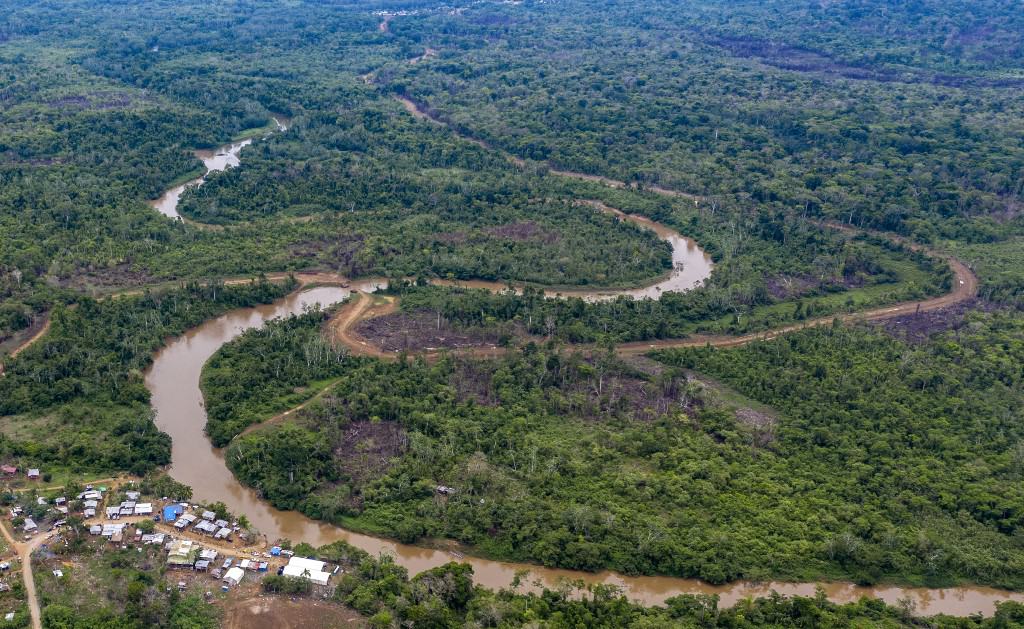More than 1,500 undocumented migrants who were on their way to the United States are stranded due to the coronavirus pandemic in a jungle area of Panama, where they await border reopening before continuing their journey.
In an atmosphere of suffocating humidity, about 1,700 people — mostly from Latin America — live together in crowds in La Peñita, an indigenous town located in Darién, on the border with Colombia. COVID-19 has also reached this remote point, with infections among migrants and local inhabitants.
The small town of 50 families, constructed of rudimentary wooden houses and thatched roof, has become a temporary humanitarian assistance station where the migrants have been isolated.
In facilities with a capacity of about 200 people, some of the travelers sleep in tents and others on the ground. There are entire families, with children and pregnant women, who on their way from South America cross the dangerous Darien jungle in the direction of the United States.
But, due to COVID-19, Panamanian authorities have confined them to La Peñita.
Some “17 migrants were infected by the new coronavirus,” an official source told AFP on condition of anonymity, data confirmed by international entities. The infected have already been removed from the camp, according to sources.
Even Red Cross personnel had to abandon their duties and enter quarantine after having been in contact with a police officer in the area who died of the coronavirus, Walter Cotte, regional director for the International Federation of the Red Cross, told AFP.
Nadine González, mayor of Pinogana, the district in which La Peñita is located, suspects there are more cases.
“I know that there must be many more migrants affected by the overcrowding,” González said. “Since they have not done many tests, they do not have the real amount of positives.”
In the town, there are seven other confirmed cases of COVID-19, according to González.
Migratory flow stagnated
In Panama, which so far has 120 deaths and 4,273 cases of the new coronavirus, migrants are treated at three temporary border stations where the government, UNICEF and the Red Cross provide them with water, food and medical care.
Before the pandemic, a group of migrants was sent each day — with the permission of San José — to the border with Costa Rica, to continue their journey through Central America. But now those border crossings are closed and people have been stranded in La Peñita.
“Every day, 50 to 100 people traveled to Costa Rica, but if we already have closed borders and the controlled flow does not exist, of course there will be overcrowding,” Maribel Peña, head of the Ombudsman’s Office in Darien, told AFP.
“For the situation of COVID-19, neither Panama nor the world was prepared,” he added.
In recent days, tension has grown in La Peñita due to claims by migrants.
The government and international organizations “are saying around the world that we are fine here (…) but that is a lie,” said a Haitian, who presented himself under the name of Marco, in a video broadcast on social networks by inhabitants of La Peñita.
“There are people who have two or three children here, who sleep in the mud, on water; they don’t have a mattress,” he said.
“This is bullshit,” added another Haitian in the video that reached international authorities and organizations.
“There is no doubt that these people have a very great humanitarian need. They are human beings suffering,” Cotte said.
Overflowing aid centers
Despite the dangers endured along the way, for years the border between Colombia and Panama has become a corridor for irregular immigration, mainly for people arriving from Haiti, Cuba, Venezuela, and other countries — as distant as Bangladesh, Nepal, Congo and Cameroon.
According to official estimates, some 24,000 people entered the country irregularly from Colombia in 2019, while 3,366 entered the country in the first two months of 2020. Among them, a quarter are children, mostly under the age of six.
But given the measures enacted in response to the pandemic, the reception centers are saturated.
“The situation has exceeded capacity; we are talking about more than 2,500 migrants who are stranded in the three temporary stations,” Santiago Paz, head of the UN’s International Organization for Migration (IOM) in Panama, told AFP.
Friday, after a meeting between authorities and migrants, it was agreed to redouble sanitary measures and basic supplies.
However, Cotte cautions that migration, far from being reduced, is going to be “exacerbated.”
“Now we also have an additional economic impact caused by COVID-19,” he said.






